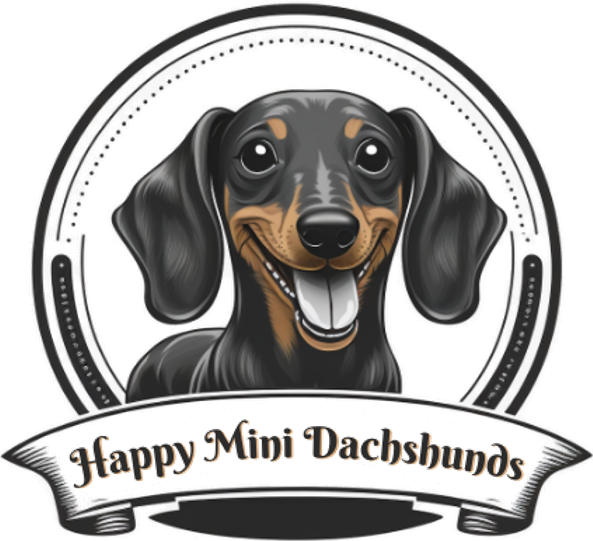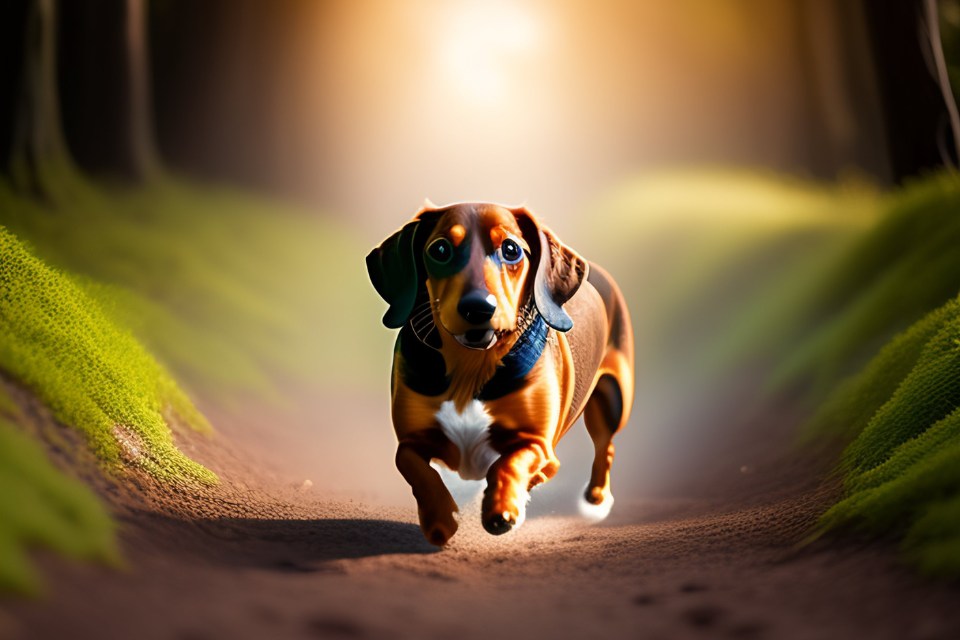Do you have a mini dachshund, or are you considering getting one? These adorable pups have become increasingly popular in recent years, but many people still wonder: what were mini dachshunds bred for?
In this blog post, we’ll take a closer look at the history and origins of mini dachshunds, exploring their original purpose and the characteristics that make them so well-suited to their roles. Whether you’re a long-time dachshund lover or just curious about these unique and charming dogs, read on to discover the fascinating story of the mini dachshund breed.
A Brief History of Miniature Dachshunds
Miniature Dachshunds were originally bred in Germany over 300 years ago, with their origins tracing back to hunting dogs. At the time, hunting was a popular activity among the aristocrats in Germany, and they needed dogs that could help them catch game. They bred Dachshunds to be low to the ground and have long bodies, making them ideal for tracking and chasing small animals like rabbits and badgers.
Over time, Miniature Dachshunds became increasingly popular as companion dogs, and their breeding began to reflect this. Today, they are still used as hunting dogs, but they are primarily kept as beloved pets. Despite their small size, they are loyal, affectionate, and playful, and they make wonderful family pets. Miniature Dachshunds are also known for their courage, which can sometimes border on stubbornness, as well as their lively and energetic personalities.
One interesting fact about Miniature Dachshunds is that their long, thin bodies can put them at risk for certain health problems, such as back injuries. It’s important to keep them at a healthy weight and avoid activities that could put too much strain on their backs. Regular exercise is also important to keep them healthy and happy.
Purpose of Breeding Miniature Dachshunds
Miniature Dachshunds are a beloved breed that has a rich history that dates back to the 17th century. Originally bred in Germany, the Miniature Dachshund was developed to hunt small animals such as rabbits and badgers. Their small size made them ideal for this task as they were able to easily fit into the burrows and tunnels of these animals.
The purpose of breeding Miniature Dachshunds was to create a small, tenacious dog that was capable of hunting and flushing out game from underground burrows. The breed was developed through careful breeding of larger Dachshunds, which were used for hunting larger prey, and smaller terrier-type dogs, which were used to catch smaller prey.
Miniature Dachshunds were specifically bred to be smaller than standard Dachshunds, weighing between 11 and 16 pounds and standing no taller than 6 inches at the shoulder. They were bred to have a long, slender body with short legs, making them well-suited to navigating through the narrow tunnels of burrows and chasing after prey.
The process of breeding Miniature Dachshunds was not easy and required careful attention to detail. Breeders had to ensure that they were selecting dogs with the right temperament and hunting skills, as well as breeding for desirable physical traits such as a long, narrow body and short legs.
Despite the challenges, the breeding of Miniature Dachshunds was a success, and the breed became increasingly popular throughout the 19th and 20th centuries. Today, Miniature Dachshunds are a beloved companion dog and remain a popular breed among dog owners.
One of the key traits that make Miniature Dachshunds such great companions is their loving and playful nature. They are incredibly loyal to their owners and enjoy spending time with their families. They are also known for being great with children, making them a popular choice for families with kids.
In addition to being great companions, Miniature Dachshunds are still used for their original purpose of hunting. While their hunting abilities may not be as necessary as they once were, many Miniature Dachshunds still participate in activities such as earthdog trials, which allow them to showcase their natural hunting skills.
Related: What is a Micro Mini Dachshund
Hunting Abilities
Dachshunds were originally bred as hunting dogs, with their primary purpose being to hunt small animals like badgers, rabbits, and other burrowing animals. Miniature dachshunds, which were bred to be smaller than their standard-sized counterparts, were used for the same purpose, but their smaller size made them more suitable for hunting smaller prey, such as rats.
Miniature dachshunds have a highly developed sense of smell, which makes them excellent trackers. They were bred to be fearless and determined, and they have a strong prey drive, which makes them highly effective at tracking and hunting small animals. Their long, low-slung bodies allow them to easily follow prey into burrows and other tight spaces.
When hunting, miniature dachshunds work in packs, with each dog using its keen sense of smell to track the prey. Once the prey is located, the dachshunds use their powerful jaws and sharp teeth to capture and kill it. They were also trained to bark loudly to alert their owners of their success.
Because of their hunting abilities, miniature dachshunds were highly prized by hunters, and they were often used to hunt in challenging terrain, such as dense forests and rocky terrain. Their small size, tenacity, and courage made them highly effective at hunting, and they were often used to clear farms and other areas of vermin and other pests.
Although miniature dachshunds are no longer used for hunting as much as they once were, many still possess the hunting instinct and make great hunting companions. They excel in activities such as tracking, scent work, and agility, and they are often used in these types of competitions.
It’s important to note that while miniature dachshunds have a strong prey drive, they can also be trained to be good family pets. Early socialization and training are important to ensure that they are well-behaved and well-adjusted. With the right training and socialization, miniature dachshunds can make loyal and affectionate pets that are great with children and other animals.
Miniature Dachshunds as Companions
Miniature Dachshunds, originally bred for hunting purposes, have now become popular companion dogs. They are affectionate, loyal, and playful, making them excellent pets for families, single owners, and seniors alike.
One of the reasons why Miniature Dachshunds make such great companions is their adaptability to various living situations. They are happy in small apartments, as well as larger homes, and they are content with moderate exercise, such as a daily walk. They are also adaptable to different climates, making them great pets for those who live in both hot and cold climates.
These dogs have a loving personality, and they enjoy spending time with their owners. They are often described as “velcro dogs” because of their desire to always be near their humans. Miniature Dachshunds are known for their loyalty and affection, and they thrive on human interaction.
Miniature Dachshunds are also playful dogs that enjoy a good game of fetch or tug-of-war. They are often described as “clowns” because of their amusing antics, and they will keep their owners entertained with their playful personalities.
One thing to note is that Miniature Dachshunds can be stubborn and independent, which is a trait they inherited from their hunting dog ancestry. This independence can sometimes make them a challenge to train, but with patience and consistency, they can be trained to follow basic commands and even some tricks.
Another important aspect of Miniature Dachshunds as companions is their socialization. Proper socialization is important to ensure that the dog is comfortable around other people and animals. Socialization should begin at a young age and include exposure to different people, animals, and environments.
Despite their small size, Miniature Dachshunds make great watchdogs. They are alert and will bark to alert their owners of any potential danger. This trait also makes them excellent therapy dogs, as they can provide comfort and companionship to those in need.
Miniature Dachshunds are also a great choice for families with children. They are patient and gentle with children, and they enjoy playing with them. However, as with any dog, it is important to supervise interactions between children and dogs to prevent accidental injury.
Related: What is a Dapple Mini Dachshund?
Health Issues
Miniature Dachshunds are generally healthy dogs, but like all breeds, they are prone to certain health issues. It is important for potential owners to be aware of these issues and take steps to prevent or manage them.
One of the most common health issues in Miniature Dachshunds is obesity. Due to their long bodies and short legs, they are prone to weight gain, which can lead to serious health problems such as diabetes, joint problems, and heart disease. To prevent obesity, it is important to provide your Miniature Dachshund with a balanced diet, regular exercise, and limit their food intake.
Another common health issue in Miniature Dachshunds is back problems. Their long bodies and short legs put them at risk of developing intervertebral disc disease (IVDD), a condition in which the discs between the vertebrae in their spine degenerate and can rupture, causing pain, loss of mobility, and even paralysis. To prevent IVDD, it is important to avoid activities that put a strain on their back, such as jumping from high places or running up and down stairs. Regular exercise can help strengthen their back muscles and reduce the risk of injury.
Miniature Dachshunds are also prone to dental problems, such as tooth decay and gum disease. Regular dental care, including teeth brushing and regular check-ups with a veterinarian, can help prevent these issues and maintain your Miniature Dachshund’s oral health.
In addition, Miniature Dachshunds are at risk of certain genetic conditions, such as progressive retinal atrophy (PRA), a degenerative eye disease that can lead to blindness. It is important to have your Miniature Dachshund’s eyes checked regularly by a veterinarian to detect any signs of PRA early and to take steps to manage the condition.
Lastly, Miniature Dachshunds are also prone to skin problems, such as allergies and infections. Regular grooming, including brushing and bathing, can help prevent these issues and keep your Miniature Dachshund’s skin healthy.
Conclusions
In conclusion, Miniature Dachshunds were originally bred for hunting purposes, but today they make wonderful companions for individuals or families. Their small size, loyalty, and loving nature have made them a popular breed among pet owners. Despite their playful personalities and charming appearance, it is important to remember that Miniature Dachshunds can be prone to certain health issues such as back problems, dental issues, and obesity. It is essential to provide them with a healthy diet, regular exercise, and appropriate veterinary care to ensure their wellbeing. Overall, Miniature Dachshunds are a delightful and cherished breed that have captured the hearts of many.

